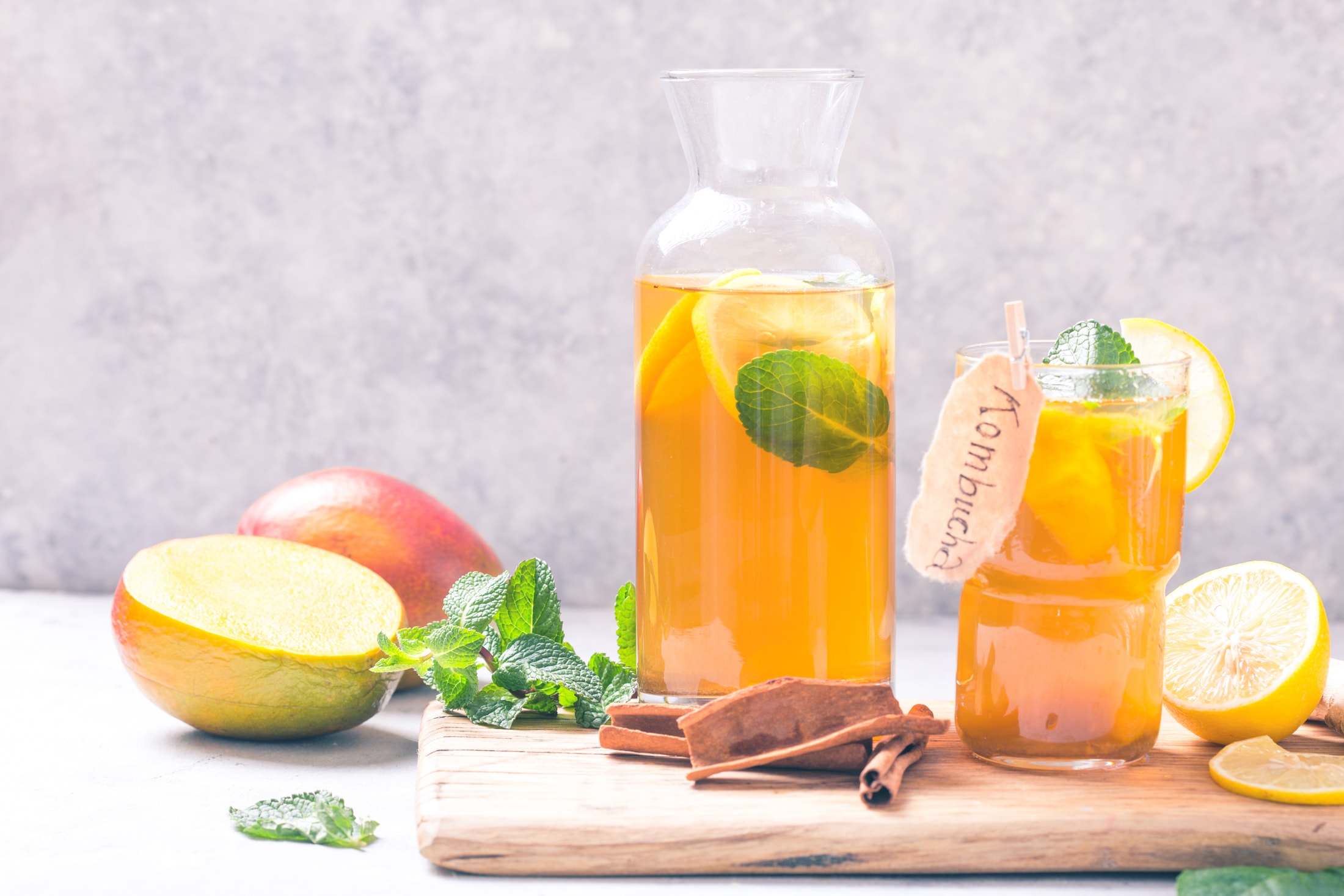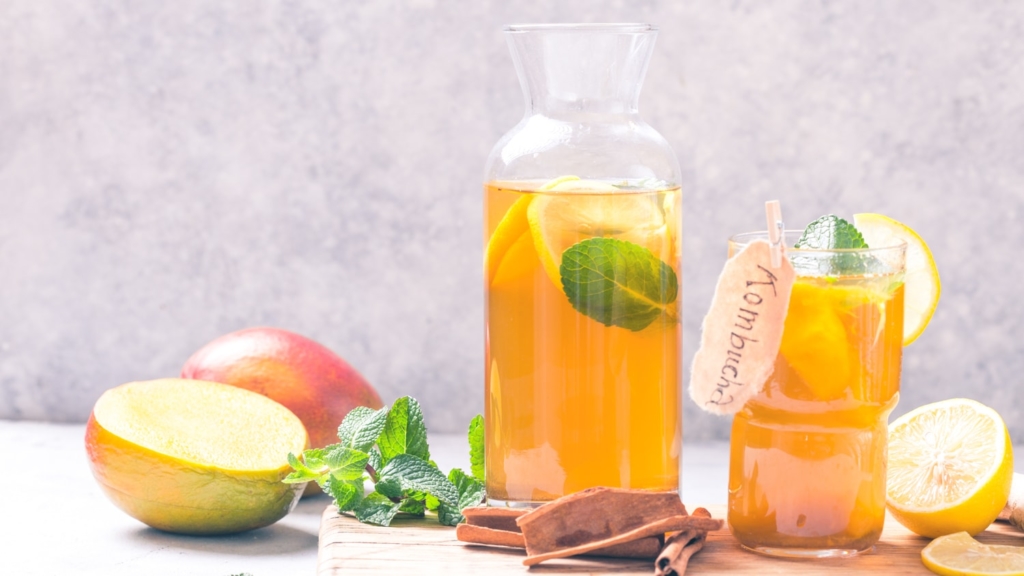What Do We Know About Kombucha? If you have been following our story for a while now, you will know that we sing from the rooftops about good gut health and the impact that reducing inflammation, especially in the gut, can have on increased bioavailability and overall well being. Today we want to share more about what we know about Kombucha and how this popular drink is now a staple in the stores and could be considered for your home fridge too.
Kombucha is a fermented tea drink commonly known as a functional beverage1 in the nutrition and wellness industry. History documents its ancient uses2 and origination from China3 where what we now know as Kombucha was first made by fermenting black tea with sugar and a symbiotic culture known as a SCOBY or Mother. This culture is a combination of bacteria and yeast that eats the sugar in the tea, over seven to ten days a cocktail of chemical components boasting possible health benefits forms.
The fermentation of food and drink is not a new practice by any means. The technique has been used to preserve foods for longer shelf life, and in ancient times the process was used for seasonal changes so that foods could be available all year round. The benefits of fermented foods, in general, are their ability to support the gut microbiome and a study in Switzerland back in the 1960s suggested that drinking fermented tea was as good as eating probiotic yogurt4 with a more recent conversation calling it “the yogurt of the 21st century.”5 Other famous fermented foods are things like kimchi, sauerkraut, and even some pickles. It’s the lactic-acid created in these fermentation processes that could hold the key to the probiotic function of all these foods and drinks. 6
Interestingly human studies on Kombucha and its health benefits are limited. Many call for more clinical trials in this area, which will add to the already well-documented probiotics conversations. From the research gathered from animal studies and personal anecdotal testimonies, it is fair to say that there are many benefits to Kombucha, and a systematic review7 highlights some of the research available.
So, here’s what we know about Kombucha! Kombucha contains several antioxidants,8 which help cleanse the body of free radicals that can damage our cells. Other benefits to this therapeutic drink are its ability to kill bacteria. This is possible due to its high acetic acid levels, which are found in things like vinegar. Kombucha made from black or green tea appears to have strong antibacterial9 and antifungal properties and can have a prolific effect on candida yeast infections.10 Kombucha’s effects on cholesterol are positive and how it interacts with blood sugar levels also makes for interesting reading.11 As we have discussed earlier, probiotics’ potential benefits and those found in Kombucha are vast. Probiotics12 can help reduce inflammation, aid digestion, and even help with weight loss. An increased body of research links probiotics and gut health to promoting good mental health.13
In other blogs, we have talked before about our gut’s diverse biological environment and how 70% of our immune system resides in its walls. We have also shared extensively on the ancient ingredients found in our products like frankincense, turmeric, and reishi mushrooms that could impact our gut environment and general wellness. What we know about Kombucha is that it is a growing market with ancient roots. There are hundreds of different flavors available at the store, but Kombucha can be made and mastered at home too.14 We also know that Kombucha has potential and extensive health benefits, which are only at the beginning stages of being thoroughly researched. So, as seasons change and the wellness factor remains at the top of our list, we celebrate the benefits of any functional foods and drinks, like Kombucha, which can influence gut health for good. Cheers!
Related Products
1. https://www.hindawi.com/journals/jchem/2015/591869/
2. https://www.sciencedirect.com/science/article/pii/S1047279718307385#bbib7
3. https://onlinelibrary.wiley.com/doi/full/10.1111/1541-4337.12073
4. https://onlinelibrary.wiley.com/doi/full/10.1111/1541-4337.12073
5. https://www.forbes.com/sites/christinatroitino/2017/02/01/kombucha-101-demystifying-the-past-present-and-future-of-the-fermented-tea-drink/
6. https://pubmed.ncbi.nlm.nih.gov/24290641/
7. https://www.sciencedirect.com/science/article/pii/S1047279718307385#bib8
8. https://www.sciencedirect.com/topics/medicine-and-dentistry/antioxidant-activity
9. https://www.healthline.com/nutrition/8-benefits-of-kombucha-tea#TOC_TITLE_HDR_5
10. https://onlinelibrary.wiley.com/doi/abs/10.1111/j.1745-4514.2011.00629.x
11. https://pubmed.ncbi.nlm.nih.gov/22591682
12. https://www.healthline.com/nutrition/8-health-benefits-of-probiotics
13. https://pubmed.ncbi.nlm.nih.gov/25862297
14. https://www.simplyrecipes.com/recipes/how_to_make_kombucha_at_home
Medical Disclaimer: All content found on the x5naturals.com website, including text, images, audio, or other formats were created for informational purposes only. It is not intended to provide medical advice or to take the place of such advice or treatment from a personal physician. All readers/viewers of this content are advised to consult their doctors or qualified health professionals regarding specific health questions. The publisher of this content does not take responsibility for possible health consequences of any person or persons reading or following the information in this educational content. All viewers of this content, especially those taking prescription or over-the-counter medications, should consult their physicians before beginning any nutrition, supplement or lifestyle program. Links to educational content not created by X5 Naturals are taken at your own risk. X5 Naturals is not responsible for the claims of external websites and education companies.


